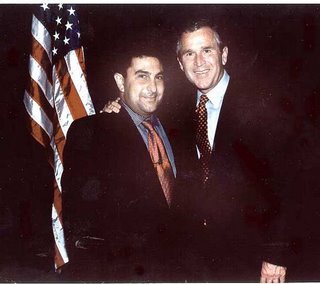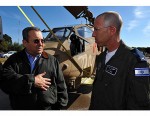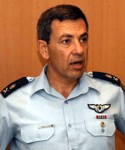
Covert assassinations by CIA2/MOSSAD, VIA a long term "liaison" with the bloodthirsty and cruel assassin ASEF SHAWKAT; are meant to create fear and submission. This is an OLD CIA2 dirty tricks campaign... with many historical precedents.... " Documented shelf cases do exist...** "
Endless and Perpetual Wars await the World's Energy Basins for decades to come.

In order to serve PNAC's global domineering and hegemonic designs in the name of securing energy supplies to the USA, by militarizing energy security and the global sea-lanes, pipelines and port facilities....we have witnessed endless turmoil since 1948. The list is long, suffice it to list the following: The Korean war and Vietnam wars, Laos, Cambodia, The Coup D'état in IRAN 1953, the SUEZ war 1956, The Baghdad alliance.... the Eisenhower doctrine.... etc. the 1967 imperial Israeli war, the never ending overt and covert wars on Lebanon's borders, East and South.... the 17 years wars over Lebanon.... and the 15 years of economics war on Lebanon's people with the advent of the Hariristan clans and the devastation of the CIA agent and puppet, Fouad Sanioura, after the calamities of the Amine Gemayel economic and security wars and devastations. The Khomeini revolution, the Iran/IRAQ wars, the millions of dead and wounded, the inconclusive ending of that war. More covert wars on the region, when Saddam Hussein was "pushed" into Kuwait....( April Glaspie etc. ), the first Gulf/oil war, the blockade of Iraq over 14 years, millions dead and maimed and scarred for life....the advent of PNAC, the endless wars in south Lebanon, massacres etc., the April understanding with the tragic consequences for many.... the Oslo accords and the fake Madrid conference, which both added to NAUGHT. The PNAC created White House Murder Inc, the assassination of Yitzhak RABIN..... the RISE of Netanyahu....and PEREZ, both stooges of the security establishments of USA/ISRAEL.... the re-invention of Ariel Sharon, the advent of more assassinations in order to create psychological shock and awe... in order to consummate additional murders in the name of the global hegemonic designs of the PNAC Killers.....the second Gulf war, after the inside job of 9/11. The South ASIAN and central ASIAN PNAC designs, the BALKANS, etc. etc. all these are but one string of concomitant events made in the dark alleys of the Pentagon/Langley/CIA2/MOSSAD/Herzliah/MI6....It was meant to create fear and submission by the regions' authorities. George Bush Sr., was the CIA Director at the time and there were close ties that linked the Bush family to oil businesses and key politicians in the world. James Baker who was appointed Secretary of State owned the Commerce Bank of Texas in Venezuela. Various CIA2 agents arrested by many authorities for bombings, assassinations, murders, etc. threaten to reveal details which would create another “Watergate” – secrecy, hidden documents all end up cover ups for realities of situations that take place beyond the score of public review, though the power behind the power in USA's secretive elites.... end up beneficiaries of the terror.... The list is long and painful, from Ambassador Adolph DUBS's murder In Afghanistan, to Salim Al-Laouze, to Rene Mouawad, from YItzhak Rabin to Elie Hobeika, from Rafic Hariri to Benazir Buttho..... the Killers are intertwined......
http://univercia.blogspot.com/2008/04/us-ambassador-adolph-dubsrip.html
Case in point: Syria's joint venture agreement with the White House Murder Inc, for decades:










.jpg)




The Alawite Regime always knew what they want, and always knew their limits and their shareholders agreement with the PNAC killers and its odious white house murder Inc, : The ASSAD Mafia always knew that the Golan are off the table, but that Lebanon will always be on the table for an endless tug of war with Israel.... within a very strict code of unethical behavior, meant to preserve, protect and perpetuate the ASSAD hegemonic continuum over Syria's power structure.

Syria has drafted a document defining boundaries on the Golan Heights, placing Syria on the northern shore of the Kinneret. Damascus is waiting for an Israeli reply through Turkish mediators.
There is something absurd about the current talks between Israel and Syria and about Turkey's alleged role as a peace broker. Turkey is basically telling Israel to relinquish territories to Syria to achieve peace, while Turkey itself achieved peace with Syria as a result of its obstinate refusal to give in to its territorial demands over the Hatay (or Alexandretta) Province.
Historically, the Hatay Province is more Syrian than Turkish. European maps from the 18th century show this region as being part of Syria. With the end of World War I and the dismantling of the Ottoman Empire, Hatay became part of the French Mandate over Syria. Turkey, however, claimed that it should have been granted sovereignty over the province because of the high percentage of ethnic Turks living there. In 1921, France and Turkey signed a compromise granting a special autonomy status to the province, but this compromise was basically canceled in 1925 when France fully reestablished its sovereignty over Hatay.
In 1936, Turkey submitted a complaint to the League of Nations, demanding full sovereignty over what it claimed to be an ethnically Turkish province. The League of Nations partially accepted Turkey's claim and granted a special status to the province in 1937 (it was now "distinct but not separated" from the French Mandate). In 1938, the regional assembly of Hatay proclaimed the independence of the "Republic of Hatay," taking as an excuse the riots that had broken out between Turks and Arabs.
The name Hatay was proposed by Kemal Atatürk and the government was under Turkish control. The Turks organized a referendum approving the annexation of the province by Turkey. France, which feared German invasion, was not willing to open an additional front with Turkey over the issue of the Hatay Province. The League of Nations was too "busy" with the looming war, and had ceased to be relevant anyway.
SYRIA NEVER recognized the annexation of Hatay (which it calls Liwa Aliskenderun) by Turkey. It claims that the Turkish annexation was illegal and that France had no right or authority to tacitly agree to it. Official Syrian maps still show the province as being part of Syria. For many years, the conflict over the province created military and diplomatic tensions between the two countries. Syria's position was that there could never be peace with Turkey until Turkey returned the province. Turkey accused Syria of supporting the Kurdish separatist groups in eastern Turkey, but never offered to withdraw from Hatay to convince Syria to end its support for them.

And yet, Syria and Turkey announced in 2005 the normalization of their diplomatic relations. Syria did not abandon its claims over Hatay, but it did abandon its demand for a return of the province to its sovereignty as a condition for ending hostilities.
TURKEY ACHIEVED this volte-face through steadfastness. The Turkish position was clear: There is nothing to talk about. Turkey is interested in peace with Syria, but can also do without it. If Syria wants peace, it has to forget about Hatay and stop supporting Kurdish terrorism. End of story.
Turkey's strategy worked, which makes its "recommendation" to Israel to adopt the opposite strategy to achieve the same results quite puzzling indeed. No less puzzling is the fact that Israel is putting up with this farce.
Some say that one cannot compare Turkey's rights over Hatay with Israel's rights over the Golan. True enough - Israel has a much stronger case than Turkey. Israel conquered the Golan in a war of self-defense, while Turkey annexed Hatay taking advantage of France's crumbling power. Israel has a stronger case than Syria as well. Archeological discoveries in the Golan point out to an antique Jewish, not Syrian, presence there. The Golan has been under Israeli sovereignty for 40 years and under Syrian sovereignty for 20. In international relations, time is one of the factors that determine sovereignty. Didn't the British Foreign Office recently declare that not recognizing China's sovereignty over Tibet had become "anachronistic"?
But even if Israel has a stronger case over the Golan than Syria, would it not make sense for Israel to relinquish it to achieve peace on its northern border? After all, Israel achieved peace with Egypt after withdrawing from Sinai, didn't it?
Well, no, it didn't. What Israel achieved with Egypt is not peace but a permanent cease-fire. And the price we paid (relinquishing Sinai) was worth paying and for pulling Egypt out of the Soviet orbit, since we couldn't afford an endless war of attrition with the Soviet-backed Egypt at the height of the Cold War.
What was worth paying in the case of Egypt is not worth paying in the case of Syria. The permanent cease-fire is the only kind of peace that can be achieved in the Middle East. We have that with Syria. Syria is no major regional power supported by a superpower hostile to Israel. The de facto peace we currently have is based on Israel's deterrence. Talking about a possible Israeli withdrawal from the Golan while Syria buys Russian weapons and tries to build nuclear plants with Iranian support is the best way to decrease Israel's power of deterrence. Why should we pay a high price (the Golan) for something we already have (de facto peace)?
If Israel wants to keep its northern border quiet and even normalize its relations with Syria, it should learn from Turkey's example and ignore Turkey's "friendly advice." Instead of withdrawing from the Golan Heights, Israel should withdraw from the Golan talks....

In any peace agreement with Israel, Syria is not only interested in regaining the Golan. Damascus also wants America; they want the same type of economic assistance the Americans gave the Egyptians and Jordanians after they signed their peace agreements with Israel, they want much closer ties to the US, and they want the US to wink at what they believe is their right to influence Lebanon.
The US, in turn, has two major quarrels with the Syrians. The first has to do with Syrian actions to undermine the development of a pro-Western democracy in Lebanon, and the second is the terrorists' use of Syria as a staging ground for attacks inside Iraq.
The US sees Damascus as a regional problem, not only an Israeli one. And, unlike Israel, the US position has been that there has to be some kind of Syrian behavioral modification before the door to Damascus can be opened.
The type of change in behavior the US wants to see is an end to the use of Syria as a staging ground for terrorists; an end to Syria's efforts to undermine efforts to set up a pro-Western government in Lebanon; an end to support, both material and moral, for Hezbollah and Hamas; and an end to Damascus's tight tango with Iran.
From an American perspective, Syria's international isolation has had an impact, and if Damascus looked inward it would see the following: a string of assassinations in Damascus over the last year that, while Syria blamed them on Israel, were likely either home-grown or connected to Saudi Arabia; the destruction of an alleged nuclear facility by Israel; a US commando cross-border raid in October; and the fact that Syria's best friends in the world are sitting in Teheran.
The American position has been that the screws should continue to be turned on Syria, so that it will realize that this situation is not in its interest and begin to modify its actions.
This has been the present administration's position, and - judging from the people President-elect Barack Obama has selected for key national security positions - it is likely to continue under the new one.
Although the Obama administration may want to talk to Damascus, just as it wants to talk to Iran, that doesn't mean it will give the Syrians anything concrete until they change their behavior.
What this means for Olmert is that all the talk of achieving peace with Syria now is divorced from reality, because in exchange for any deal with Israel, the Syrians are going to want a massive buy-in from the US.
And that type of American buy-in is not on the horizon - at least not for the foreseeable future....

-------------------------------------------------------------------------------------------------------------------------------------
**---- The US Army School of Americas (SOA now known as the Western
Hemisphere Institute for Security Cooperation) has been under attack
for using terror for foreign policy objectives. The mission of the
school is to train Latin American soldiers in combat, Counter-
insurgency And counter-narcotics. It therefore should come as no
surprise when nearly all of Latin America’s human rights abusers have
actually graduated from the school including Panama’s Manuel Noriega a
CIA operative until he was removed by the US in 1989. Graduates of the
SOA were also part of the 1973 military coup in Chile, the 1976
assassination of former Chilean ambassador Orlando Letelier in
Washington, and the wars in Argentina and Bolivia in the 1970s. The
SOA is also responsible for training Anastasio Somoza’s National Guard
in Nicaragua in the 1970s, the civil war abuses in El Salvador and
kidnappings in Colombia as well as murders of peace commissioner.
President Eisenhower during his presidency used plenty of covert
operations through CIA to overthrow suspected communist Governments.
Three attempts were made during his Presidency to overthrow
Governments in Iran – CIA replaces Muhammad Mossadegh with Shah
Muhammad Reza Pahlavi (when Mossadegh seized British oil properties in
1953). In Guatemala, the CIA overthrew Jacobo Arbenz Guzman in 1954 &
Indonesia in 1958 with the overthrowing of Sukarno. His Eisenhower
Doctrine promised Middle East nation’s military aid if they were being
threatened by communism.
Presently, there is much focus against Iran and a build up made to
project Iran as fostering terrorism and nuclear weapons. In 2007,
Congress agreed to President Bush’s request to fund a major covert
operation against Iran. A covert operation would mean working with
opposition groups which ultimately will create another terror force.
Is it these creations that eventually refuse to be bound to their
masters and prefer instead to take their own path of instilling terror
and anarchy?
The issue of using covert state terrorism to advance neo-liberal
global project has varied views – we can take as an example the CIA
bombing of a Cuban airliner on October 6, 1976 which killed 73
innocent civilians. It was meant to create fear and submission by the
Cuban authorities. George Bush Snr., was the CIA Director at the time
and there were close ties that linked the Bush family to oil
businesses and key politicians in Venezuela. James Baker who was
appointed Secretary of State owned the Commerce Bank of Texas in
Venezuela. Posada the CIA agent arrested by Cuban authorities for the
bombing threatened to reveal details which would create another
“Watergate” – secrecy, hidden documents all end up cover ups for
realities of situations that take place beyond the score of public
review though the public end up beneficiaries of the terror. The
western Balkans the fate of the “new Kosovo” has emerged following
detection of 3 Germans whether any moves were afoot to replace the UN
office with an EU office. However, the Kosovo media say that the 3 men
are German intelligence agents (BND). This is further to a Christian
Science Monitor report which gave details of a deal with Serbia to
deploy a EU mission in Kosovo.
The public needs to be aware of the interrelationships between the
wars in Yugoslavia, Afghanistan and Iraq. In the case of Iraq, the
Iraqi people may wonder whether the dictator Saddam was ever as bad as
their current situation where an average 50 deaths are reported
daily.
Evidence in a report compiled by German TV ZDF reveals how the CIA and
the German Intelligence (BND) supported the Kosovo Liberation Army
(KLA) which has links to the Al Qaeda. The report reveals that German
intelligence knew 3 weeks prior to the March 17 attacks on Serbs
throughout Kosovo & Samedin Xhezairi of the KLA was the link between
Albanian extremists and the Al Qaeda. Samedin Xhezair had also fought
in Chechnya, was trained in Afghanistan and was evacuated by US
paratroopers from the US private military company MPRI from Macedonia
barely a few weeks before the September 11 attack on the US. If the US
military has been working with the Al Qaeda we can but wonder what the
"war on terror" is all about.
What remains true is that the Atlantic Alliance supported the KLA and
made them attack ethnic Albanians in order to allow the NATO and US
troops to enter citing "humanitarian" grounds and accuse the Serbian
Government of ethnic cleansing. This was the US and NATO’s "just war"
which resulted in the bombing of Yugoslavia and supported by western
media which provided a disinformation campaign. No one claimed that
the invasion of Kosovo was a violation of international law. As terror
groups most of whom happen to be Islamic fundamentalists become armed
with sophisticated weaponry we not only wonder whether the peace
keeping forces are actively or passively creating a new form of terror
that is assured to turn against their creators as we have seen.
The earliest form of overt operation was committed by the US on
hundreds of thousands of innocent Japanese in 1945 by dropping not one
but 2 atomic bombs. There is also the 1965-72 napalming of large areas
of Vietnam and then the 2003 bombing of Baghdad once again by US
troops.
When a nation’s public silently agree to covert operations because
their State Dept labels nations as “rogue nations” the damage is
colossal. Was not the “Special Forces” trained during the World War 2
men who were trained in unconventional warfare? The US media has been
party to most of the heinous crimes that the US Government’s covert
operations have ventured upon. Without balancing their argument they
prefer to project everyone as enemies of the US. In many ways the 9/11
became a wake up which left many asking whether the US’s decision of
turning teams hostile to other nations was not another form of
terrorism? The CIA’s budget is Top Secret and even not disclosed to
Congressmen. So while there is the US military there is also another
set of private and shadow force with the power above US law. As we
read deeper into US "interests" we need to realize how far the US is
likely to go to protect "US interests?" The US entered Somalia in 1991
on the pretext that 1000 people were starving – it turned out not to
be quite the contrary.
What should countries like the US wish to make countries unstable – is
this the way they look after the people’s human rights? There are many
ways invasions are justified – to save people from ruthless dictators
and weapons of mass destruction as was the Iraq example, starvation
was the reason in Somalia, genocide in Kosovo, 9/11 in
Afghanistan….now the covert operations in these nations by US Special
Forces means that men are being trained and supplied with arms so long
as they remain faithful to US interests. Saddam Hussein was a friend
of the US in the 1980s & so was Ousama bin Laden....








































